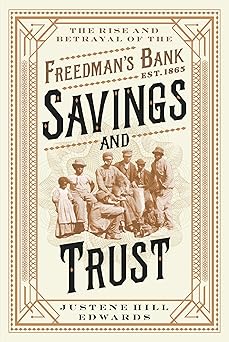
The Freedman’s Bank was a financial institution established during the Reconstruction era in the United States. The bank was created to help former slaves deposit their earnings and invest in the future. African Americans saw this bank as a means to achieve economic self-determination and growth. Millions of dollars were deposited into the bank by tens of thousands of former slaves, who believed that this new financial institution would be their key to a better life.
The bank's early years were filled with hope and promise. Some prominent figures of the time, such as Abraham Lincoln, Frederick Douglass, and General O. O. Howard, supported the bank's mission. However, behind the scenes, white financiers who controlled the bank worked to sabotage its success. They undermined the bank's efforts by targeting its African American depositors and cashiers. This sabotage led to a significant setback in the fight for economic autonomy. The bank's collapse had a devastating impact on the African American community, wiping out millions of dollars in savings.
The fall of the Freedman’s Bank was a pivotal moment in American history. Historian Justene Hill Edwards sheds new light on this tragic event, revealing the deep-seated racial tensions that led to its downfall. Edwards argues that the bank's failure was not due to the actions of individuals like Frederick Douglass or its African American depositors, but rather the systemic racism of its white financiers. Through a detailed and engaging narrative, Edwards uncovers the story of a financial institution that had the potential to be a game-changer for African Americans but ultimately succumbed to the forces of oppression. This book is a powerful exploration of the roots of racial economic inequality in America and a must-read for anyone seeking to understand this critical chapter in the country's history.
I just finished reading a book that was a powerful reminder of the struggles faced by African Americans in the post-Reconstruction era. The author takes a close look at the Freedman's Bank, a financial institution that was established to help former slaves achieve economic self-determination. I must say that I was deeply moved by the stories of the people who worked at the bank and the depositors who put their trust in it. It's heartbreaking to think about what happened to millions of dollars in savings, which were essentially wiped out by sabotage and racial prejudices.
As I turned the pages, I couldn't help but think about the dreams that African Americans had when they first started using the bank. The idea of being able to invest in their future and build a better life for themselves and their families was a tantalizing prospect. But behind the scenes, those college-educated men and women were being targeted and discriminated against, drained of their wealth and power. It's almost too painful to think about. But the author reminds us, through meticulously researched chapters, that this was not just a personal tragedy, but also a symptom of the systemic racism that has persisted in America for centuries.
The author's writing is engaging, and the narrative is both captivating and disheartening, a perfect balance for this kind of book. I found myself wanting to keep reading to the end, to see if the story could be pieced together and if the author could shed new light on this painful chapter in American history. I think this is one of those books that can make you rethink certain events in American history, and it's definitely one that will make you think about the ways in which systemic racism affects our society today.
Rating: 4.5 / 5.0
The author has provided a comprehensive account of the Freedman's Bank and its tragic history. I would rate this book 4 out of 5 stars. The author has done an excellent job in shedding light on the deep-seated racial tensions that led to the bank's downfall, and the narrative is deeply engaging and thought-provoking. The stories of the people who worked at the bank and the depositors who lost their wealth are heartbreaking, and the author's writing is both captivating and disheartening. The book is a powerful exploration of the roots of racial economic inequality in America, and it's a must-read for anyone seeking to understand this critical chapter in the country's history.